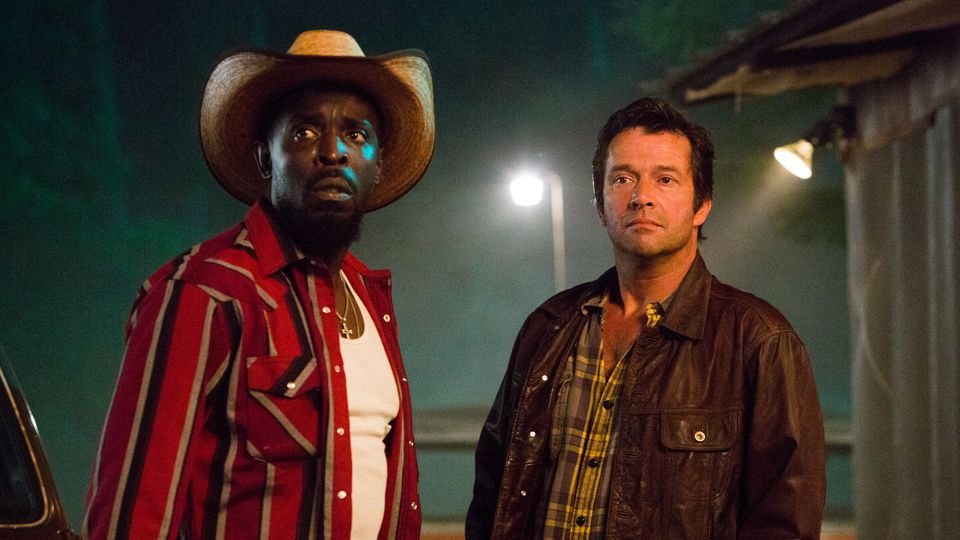
“That little bugger always hangin’ around, getting’ on my damn nerve.” – Leonard Pine
I watched Eskimos, the season one finale of Hap and Leonard, shortly after it aired last Wednesday night, but I did not begin writing this until several days later. I needed that space to consider what I had watched. I didn’t want to rush a piece just to get it posted quickly, when I still was not completely certain what my thoughts were. There is nothing more frustrating for someone who writes criticism than to rush through a review, only to realize after a few days that his or her opinion has shifted. Usually, the opinion does not shift a lot, so it is not a huge deal, but it is still frustrating.
The other reason I felt I needed a moment was that I was unsure how much of the impact the episode had on me was from what the cast and crew put together and how much I was bringing from the novel. I have tried extremely hard this season to only write about what the show is doing, and not compare it to Joe R. Lansdale’s novels. Needless to say, I have not been entirely successful in that endeavor. Despite trying to give myself a little cushion to organize my thoughts, I am still unable to fully divorce the emotional impact of Eskimos from the novels.
After watching Eskimos, I was struck by how unusually Mickle and Damici have structured this entire season. This episode made me rethink my initial opinion that parts of Savage Season and The Bottoms were clunky. It was just that the ways in which flashbacks, the sudden jumping forward in plot, and just as sudden slowing down for patient character building were intermingled felt incomplete somehow. But with Eskimos, all of those seemingly random choices made perfect sense as the episode built on those earlier scenes to deliver one emotional payoff after another.
Considering the way War ended on a cliffhanger, it took guts to open with a flash-forward to Hap walking through the destruction of Leonard’s house. We immediately know at least Hap survived Soldier’s wrath, taking away a little suspense from what is to come. Hap begins the long, slow process of cleaning up the house and the scene ends with him comforting Switch, Leonard’s dog, and saying, “I know, buddy. I miss him too.”
This is honestly the only point in Eskimos that felt like a misstep to me. It sets up a false mystery. Even viewers who have not read the novels have to realize that Leonard is not dead. All you have to do is look at the title of the show. Thankfully, after that moment, the episode kicks into gear, both viscerally and emotionally.
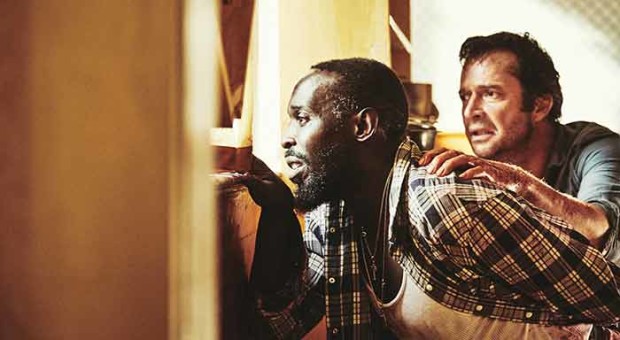
The episode continues cutting back-and-forth between the standoff and Hap going through Leonard’s house in the aftermath. Despite knowing Leonard was never in danger of dying, I do give credit to Jim Mickle’s direction and Michael K. Williams’ performance for pumping urgency into the situation. Leonard certainly looks and acts like he is on death’s door. It is not with his usual cynical eye, but out of hopelessness that he declares, “We ain’t getting out of here, Hap. Not alive.”
The title of this episode comes from a (probably untrue) factoid that Soldier tells in order to mock Hap about Trudy leaving him to hang, yet again. In typical Soldier fashion, the factoid is meandering, funny, and crass and serves merely as a distraction for (the very much still alive) Angel to get the drop on Hap and Leonard.
In earlier episodes, we have seen Angel slit a man’s throat and beat a helpless bystander to death with a telephone. But nothing prepared me for the brief, but epic, fight between her and our heroes.
Pollyanna McIntosh cuts a striking figure and watching her throw two strong men around like they were rag dolls was both hilarious and frightening. That it takes both Hap and Leonard to finally take Angel down for good—and endure several more injuries in the process—is only appropriate for such an instantly iconic figure.
And while it was a cathartic moment in the episode, it was also surprising to find Angel’s death coming only nine minutes into the episode. As I thought to myself, “I guess they are going to really lean heavily on Soldier versus Hap and Leonard the rest of the way,” Soldier took a bullet through the head at the twelve-minute mark. And then, just four minutes later, Trudy’s lonely death leaves only Hap and Leonard breathing. At this point, I knew I was going to have to re-watch Eskimos, if only to obsess over the insane pacing.
But before I go on to compliment Mickle and Damici on the way they constantly kept me off balance and hit surprising emotional notes with their jumbled up timeline, I want to talk a little about Soldier’s death and how it fits into the way the series has handled violence and the soul-altering ramifications of taking a life.
With the exception of Paco’s ridiculously over-the-top demise, the violence in Hap and Leonard has been sudden, ugly, and grim. And it is not just in the actual physical act of killing that Mickle and Damici find horror, but in what leads up to death for the victim and in what it does to the killer.
Chub stood up for his belief that racism should never be tolerated and was rewarded for his heroism with a bullet to the head. Howard betrayed his peaceful idealism when he suggested that torturing Hap would get Soldier his money faster and he received the exact same outcome as Chub. The disquieting point is made that it does not matter if you live your life true to your beliefs, if someone has more power than you, they can erase your existence with nothing more than the squeeze of a trigger.
To look at this idea from the other direction, while Trudy’s killing of Soldier seems initially like a case of “good triumphing over evil,” it is played as a mournful moment by Hendricks and Purefoy. Trudy, for all her manipulations and suspect decision-making, stuck to her beliefs through torture and returned to save Hap and Leonard’s lives. But when Hap cannot bring himself to kill the wounded, unarmed Soldier, it is Trudy who pulls the trigger, murdering him in cold blood. While it could be argued that she is merely thinking practically—if only Hap, Leonard, and herself are left alive to tell the story, maybe they can claim self defense and avoid prison—there is also the very real possibility of straight revenge on her part. Soldier murdered Howard, tortured her, and tried repeatedly to kill Hap and Leonard. For that matter, he technically does kill Trudy since it is a bullet fired from his gun that causes her to bleed to death a few minutes later. In a purely black-and-white view of the story, her revenge could be seen as righteous, but instead it is presented as Trudy turning her back on her non-violent idealism.
In the end, after all of Trudy’s attempts to make Hap feel like he had been the one to turn his back on his beliefs, he turns out to be the only character capable of granting mercy to those who may not deserve it. In the novels, Hap tries his hardest to be a peaceful man, but he has the instincts of a fighter. His internal struggle between his belief that you should only fight when attacked and the violence that boils deep down in him without an outlet is a major arc through the novels and Eskimos touches on it ever so briefly as he takes a few beats longer than even Soldier expected to stop himself from pulling the trigger. For the record, Purefoy is great in this moment, never over-playing the distress Hap is going through as he makes his decision.
With as loud, chaotic, violent, and eventually sad as the first fifteen minutes of Eskimos is, it is in the extended wrap up and flashbacks that the episode really finds its emotional punch.
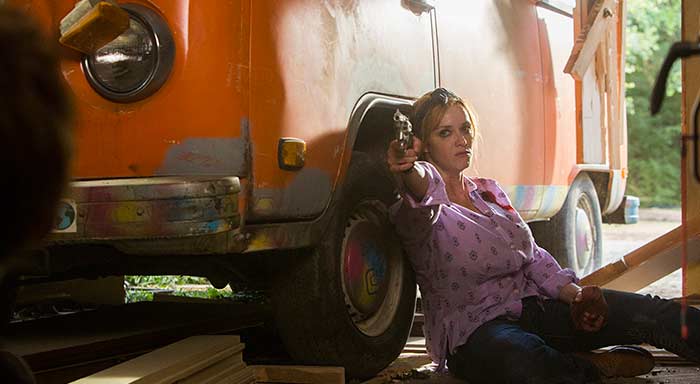
Trudy’s confession to Hap that she killed Cheep all those years ago in an attempt to free herself of him and the guilt she felt for sending him off to jail, turns out to fall on deaf ears when she realizes he has passed out from his injuries. Hap never even hears her tell him that she loves him before she dies. Hendricks plays her final scene with a rawness that is befitting Trudy when she is finally at her most honest. I never cared much for Trudy in the novel, but Mickle and Damici re-shaped her into a femme fatale with a conflicted heart and Hendricks gave her a tortured soul. Because of these changes, I found Trudy’s death particularly sad and was initially surprised by how deeply touched I was.
Hap’s awkward visit to Leonard in the hospital as he recovers from injuries that nearly killed him is punctuated by Leonard’s quiet, defeated declaration: “You’re no good for me, Hap Collins.” It’s a brutal moment for both men, especially coming after the flashback that finally pays of their meeting as young boys after the accident that kills Leonard’s (and maybe Hap’s) father. Already racked with guilt over talking Leonard into joining him in the search for the money, that assertion hurts Hap probably more than Trudy’s death. Even after finding the money and delivering it to Leonard, things are not repaired between the two of them until a three-month time leap when Leonard seeks out Hap’s company for Uncle Chester’s funeral. Instead of sounding corny or too on-the-nose, it is sweet and sincere when Leonard says, “You’re the only family I got now, Hap.” The violent events they barely survived can never be forgotten, but they can be forgiven.
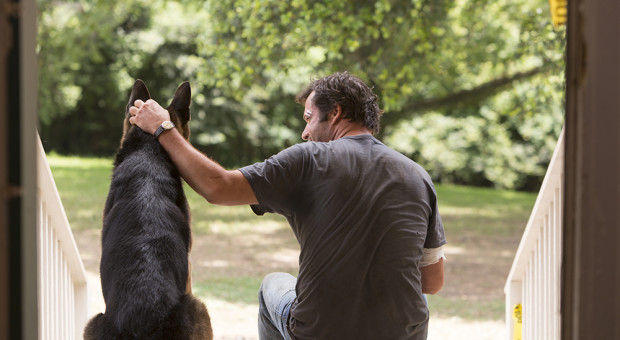
Ending the episode on the events that begin Mucho Mojo, the second Hap and Leonard novel, Mickle and Damici set up the series for a second season that may or may not happen. But in doing so, they manage to bring Eskimos back around to what matters most: Hap and Leonard leaning on each other, trying to find meaning in their seemingly directionless existence.
There is a tension between the comedy and the dread of the final scene that is punctuated by the horror of last shot. If given a second season, with the stronger source material (in my opinion) of Mucho Mojo, Mickle, Damici, Purefoy, and Williams could deliver some brilliant, unsettling Texas noir that surpasses this very good first season.
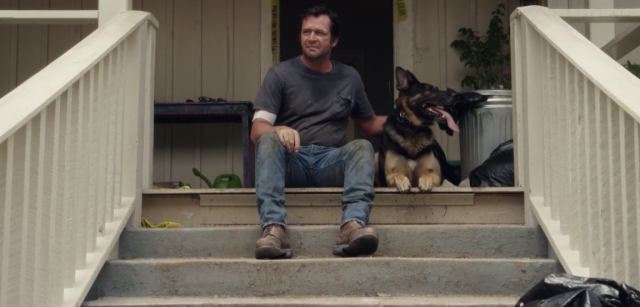
Hap and Leonard (Season one, episode six: Eskimos)
(Airs on Sundance Channel, Wednesday nights at 10:00 pm EST)
— MATT WEDGE.
[Episode Three reviewed here!]

LOOKING FOR UNDERGROUND CULT MOVIES, DVDs, LIMITED VHS & OTHER COOL STUFF?
CHECK OUT THE DAILY GRINDHOUSE/CULT MOVIE MANIA STORE!
Tags: Books, Christina Hendricks, Crime, James Purefoy, Jim Mickle, Joe R. Lansdale, Michael K. Williams, Nick Damici, Pollyanna McIntosh, TV

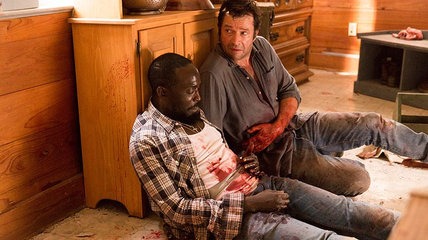


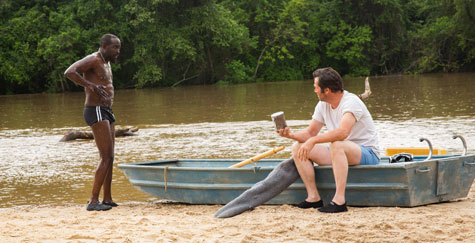
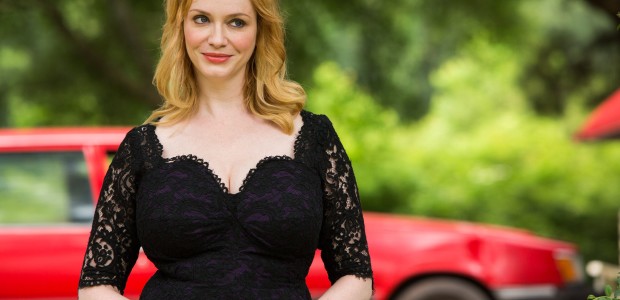

No Comments